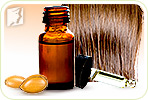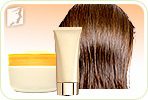For middle-aged women, suffering from hair loss, or alopecia, during menopause is one of the most emotionally debilitating symptoms. Fortunately, there is no need to put up with it any longer as easy, effective alopecia treatments are right within reach, ranging from natural options to conventional approaches.
Keep on reading to discover the best hair loss treatments for females throughout the menopausal transition, and give your hair what it needs to restore its beautiful shine!
Three Approaches to Treating Hair Loss
When treating hair loss, women can choose from among three levels of treatments: (1) Lifestyle changes, (2) Alternative medicine, and (3) Conventional medicine. They are encouraged to start with the most natural approaches - lifestyle changes and alternative medicine - and move to more risky options if strictly necessary.
Lifestyle Changes for Hair Loss Treatment

The first stage of hair loss treatment consists of implementing healthier lifestyle practices, which can bring significant improvements, although they do require the most determination and time commitment.
Nutritious Diet
Nutrients in food give the body the building blocks it needs to stay healthy, including maintaining strong hair. As such, women are encouraged to eat a well-balanced menopausal diet, which includes wholesome sources of complex carbs, healthy fats, and lean protein that are rich in the following nutrients:
- Phytoestrogens are plant compounds that exert estrogenic effects on the body, helping to balance hormone levels and treat hair loss alongside other menopause symptoms.
Soy, alfalfa, oats, tomatoes, flax
- Iron is crucial for beautiful locks. Its deficiency, with or without anemia, may be the underlying cause of hair loss in women.1
Eggs, dark leafy greens, tofu, poultry, fish
- Vitamin D lacks have been associated with causing hair loss as the vitamin helps stimulate and thicken the hair follicles.2
Papaya, carrots, squash, peaches, broccoli
- Vitamin C intake has been found essential in women whose hair loss is caused by iron deficiency.3
Camu camu, orange, lemons, bell peppers
Regular Exercise
Middle-aged women looking to treat hair loss will benefit from regular exercise as it has been shown to help balance hormone levels, thus reducing hair loss and other menopausal symptoms. As an added benefit, practicing sports can also strengthen the immune system, relieve mood swings, and manage weight gain.
Amount: Menopausal women are recommended to get about 150 minutes of low- to moderate-level exercise per week, or 75 minutes of vigorous activity.4
Type: A good workout to help treat hair loss should combine aerobic workouts with body strengthening exercises for optimal results. This includes brisk walking, yoga, or Pilates.
Useful tips: To protect already weakened hair, women may want to choose sports that do not require the use of helmets or caps for an extended period of time, such as swimming.
- Precautions: During menopause, women are at a higher risk of osteoporosis and related fractures. As such, it is a good idea to avoid high-impact exercises or injury-prone sports, keeping workouts safe and beneficial.5
Wholesome Habits
Various wholesome habits can help treat hair loss during menopause, promote hormonal balance, nourish the scalp, and keep the body rested and in optimal health. They include the following:
Lowering stress in women with hair loss is one of the most important treatment strategies as high stress can stunt hair growth or lead to hair follicle damage.6 Try meditation, positive affirmations, yoga, or conscious breathing.
Limiting exposure to harsh hair products and damaging styling techniques, like using blow dryers or hair straighteners, can help the hair become stronger and less likely to fall out.
Considering herbal remedies, such as topical applications of peppermint oil, may stimulate hair growth.7
- Quitting excessive alcohol drinking and smoking is highly important in hair loss treatment as both can directly or indirectly lead to hair becoming weak and falling out.8
Alternative Medicine for Hair Loss Treatment

The second stage of hair loss treatment is based on alternative medicine, of which herbal supplements are the most popular option. They are effective, easy to follow, and resolve the root cause of hair loss, hormonal imbalance.
There are two types of herbal supplements to treat menopausal hair loss: phytoestrogenic and hormone-balancing supplements.
Phytoestrogenic Supplements
Phytoestrogenic supplements are made from herbs, like dong quai, which contain beneficial compounds called phytoestrogens. When consumed, they mimic the body's estrogen and help balance its levels along with other reproductive hormones for symptom relief, including treating hair loss. However, their long-term use can make the body less capable of producing its own hormones, leading to further imbalance.
Hormone-Regulating Supplements
Hormone-regulating supplements, like Macafem, do not supply the body with any outside hormones. Instead, they work by nourishing the hormonal glands with nutrients to stimulate their own hormone production. This balances levels of all reproductive hormones, helping treat hair loss and other menopausal ailments. Since hormone-balancing supplements cause virtually no side effects, they are safe for long-term use.
From Nature and Health Magazine, Dr. Chacon says:
"Macafem's nutrients help restore natural hormones in women. Unlike hormone drugs, which are basically resumed in taking synthetic hormones, Macafem acts totally different in your body. It nourishes and stimulates your own natural hormone production by inducing the optimal functioning of the pituitary and endocrine glands." Click on the following link to learn more about Macafem.A combination of lifestyle changes and herbal supplements is usually the most effective and holistic approach to treating hair loss. In some cases, however, it may be necessary to consider medications or surgery.
Conventional Medicine for Hair Loss Treatment

The third stage of hair loss treatment consists of conventional medicine, namely medications or surgery. While effective, they may cause side effects. As such, their use should be evaluated on an individual basis to ensure they do not outweigh the benefits.
Medications
The choice of medications for hair loss will depend on its underlying cause. Most aim to slow down the rate of hair loss, while some may be able to stimulate re-growth. They include the following:
Minoxidil is an over-the-counter medication that is applied on the scalp to treat alopecia. However, symptoms usually return if treatment is stopped.
Anti-androgens, such as spironolactone, finasteride, or birth control pills, may be used for hair loss.
Corticosteroids in topical or injection form can benefit women whose hair loss is caused by autoimmune diseases.
Anti-fungal medications, like terbinafine, may be considered for hair loss treatment due to a fungal scalp infection.
Hormone replacement therapy (HRT) used to be the go-to treatment for hair loss and other menopause symptoms. While HRT can relieve symptoms, its use has been linked to serious side effects and health risks, as the following studies have shown. As such, HRT is reserved for severe symptoms of the menopausal transition.
Surgery
Hair transplant or scalp reduction surgeries may be considered as a solution for hair loss for some women, especially for women who have not responded to medications. While all surgical interventions carry certain risks, surgeries for hair loss are generally considered safe. Depending on the type of hair loss, women may need several procedures for best results.
Since the aforementioned approaches for hair loss treatment are not mutually exclusive, women can employ them in any combination in order to better relieve their symptoms. A growing number of women, however, are finding that combining lifestyle changes and herbal supplements are the best way to relieve symptoms and restore scalp health.
A Safe Way of Treating Hair Loss
Implementing Lifestyle Changes:
- Eating foods rich in phytoestrogens, iron, and vitamins C and D
- Exercising regularly for 30 minutes a day, 5 times a week
- Reducing stress through meditation, yoga, and deep breathing
- Avoiding harsh hair products or styling techniques
And Taking Herbal Supplements:
- Phytoestrogenic herbal supplements, like dong quai
- Or natural hormone-regulating supplements, like Macafem
Sources
- Better Health Channel. (2020). Patterned Hair Loss. Retrieved July 8, 2020 from https://www.betterhealth.vic.gov.au/health/conditionsandtreatments/patterned-hair-loss
- Clinical and Experimental Dermatology. (2002). Nutritional factors and hair loss. Retrieved July 8, 2020 from https://pubmed.ncbi.nlm.nih.gov/12190640/
- Harvard Health Publishing. (2018). Hair Loss. Retrieved July 8, 2020 from https://www.health.harvard.edu/a_to_z/hair-loss-a-to-z
- International Journal of Molecular Sciences. (2018). Hair-Growth Potential of Ginseng and its Major Metabolites: A Review on Its Molecular Mechanisms. Retrieved July 8, 2020 from https://www.ncbi.nlm.nih.gov/pmc/articles/PMC6163201/
- Mayo Clinic. (2020). Hair Loss. Retrieved July 8, 2020 from https://www.mayoclinic.org/diseases-conditions/hair-loss/diagnosis-treatment/drc-20372932
- NHS. (2018). Hair Loss. Retrieved July 8, 2020 from https://www.nhs.uk/conditions/hair-loss/
- NYU Langone Health. (n.d.). Medications for Hair Loss. Retrieved July 8, 2020 from https://nyulangone.org/conditions/hair-loss/treatments/medication-for-hair-loss
- Penn Medicine. (n.d.). Hair Loss Medications. What is Minoxidil and Finasteride? Retrieved July 8, 2020 from https://www.pennmedicine.org/for-patients-and-visitors/find-a-program-or-service/hair-transplantation/treatments-and-procedures/hair-loss-medications
- Penn Medicine. (2018). Female Pattern Baldness. Retrieved July 8, 2020 from https://www.pennmedicine.org/for-patients-and-visitors/patient-information/conditions-treated-a-to-z/female-pattern-baldness
- Skin Appendage Disorders. (2019). Complementary and Alternative Treatments for Alopecia: A Comprehensive Review. Retrieved July 8, 2020 from https://www.karger.com/Article/FullText/492035#ref21
- University of Michigan. (2019). Hair Loss: Should I Take Medicine to Regrow Hair? Retrieved July 8, 2020 from https://www.uofmhealth.org/health-library/tr2559
Footnotes:
- Iron: Harvard Health Publishing. (2018). Treating female pattern hair loss. Retrieved July 8, 2020 from https://www.health.harvard.edu/staying-healthy/treating-female-pattern-hair-loss
- British Journal of Dermatology. (2014). Vitamin D deficiency in alopecia areata. Retrieved July 8, 2020 from https://pubmed.ncbi.nlm.nih.gov/24655364/
- Dermatology and Therapy. (2018). The Role of Vitamins and Minerals in Hair Loss: A Review. Retrieved July 8, 2020 from https://www.ncbi.nlm.nih.gov/pmc/articles/PMC6380979/#CR52
- American Heart Association. (2018). Recommendations for Physical Activity in Adults. Retrieved June 8, 2020 from https://www.heart.org/en/healthy-living/fitness/fitness-basics/aha-recs-for-physical-activity-in-adults
- Journal of Mid-Life Health. (2011). Exercise beyond menopause: Dos and Don'ts. Retrieved June 8, 2020 from https://www.ncbi.nlm.nih.gov/pmc/articles/PMC3296386/
- Mayo Clinic. (2019). Stress management. Retrieved July 8, 2020 from https://www.mayoclinic.org/healthy-lifestyle/stress-management/expert-answers/stress-and-hair-loss/faq-20057820
- Toxicological Research. (2014). Peppermint Oil Promotes Hair Growth without Toxic Signs. Retrieved July 8, 2020 from https://www.ncbi.nlm.nih.gov/pmc/articles/PMC4289931/
- Dermatology. (2003). Association between smoking and hair loss: another opportunity for health education against smoking? Retrieved July 8, 2020 from https://pubmed.ncbi.nlm.nih.gov/12673073/
- JAMA. (2002). Risks and benefits of estrogen plus progestin in healthy postmenopausal women: principal results from the Women's Health Initiative randomized controlled trial. Retrieved June 8, 2020 from https://www.ncbi.nlm.nih.gov/pubmed/12117397
- The Lancet. (2019). Type and timing of menopausal hormone therapy and breast cancer risk: individual participant meta-analysis of the worldwide epidemiological evidence. Retrieved June 8, 2020 from https://www.thelancet.com/journals/lancet/article/PIIS0140-6736(19)31709-X/fulltext



